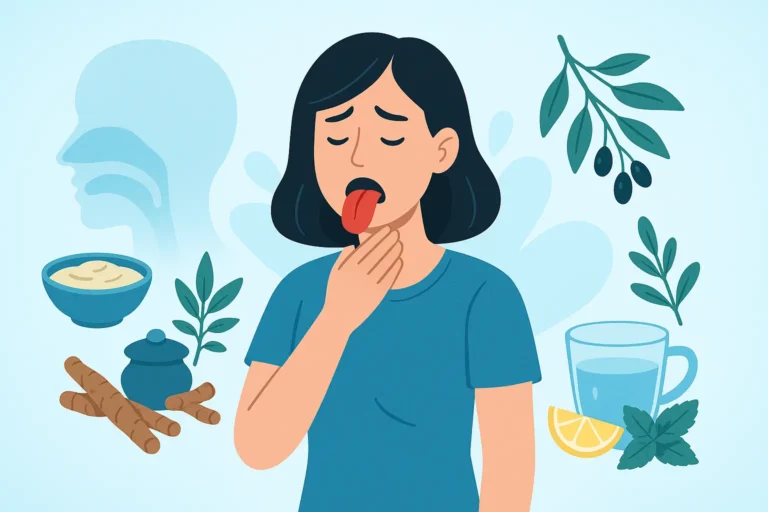Home Remedies to Generate More Saliva: What Actually Works
If you’ve ever dealt with dry mouth, you know how uncomfortable it can be. Eating, talking, even sleeping feels harder when your mouth is dry. And while there are medical treatments and store-bought products available, many people want to know: are there simple home remedies to generate more saliva?
The short answer is yes. Several home remedies can stimulate your salivary glands and help your mouth feel more comfortable. In this post, I’ll go over what saliva actually does for your body, why dry mouth happens in the first place, and the most effective remedies you can try at home today.
Why Saliva Matters More Than You Think
Before jumping into remedies, it helps to understand why saliva is important. Saliva isn’t just water. It contains enzymes that start digestion, minerals that protect your teeth, and natural antibacterial properties that keep your mouth clean.
When you don’t produce enough saliva, you may notice:
- Difficulty swallowing or chewing food
- A sticky or burning sensation in your mouth
- Cracks at the corners of your lips
- Bad breath
- Increased risk of cavities
So, increasing saliva isn’t just about comfort. It’s about keeping your mouth healthy.
Why You Might Have Dry Mouth
There are a few common reasons why your mouth might not make enough saliva:
- Medications: Many prescription and over-the-counter drugs list dry mouth as a side effect.
- Dehydration: Not drinking enough fluids, especially in hot weather or after exercise.
- Medical conditions: Diabetes, Sjögren’s syndrome, and radiation treatments can all reduce saliva.
- Age: As we get older, saliva production can naturally slow down.
- Lifestyle: Smoking, caffeine, and alcohol can dry out your mouth.
If you suspect a medication or health condition is causing your dry mouth, it’s always best to talk to your doctor. But for everyday dryness, there are several things you can do at home.
Home Remedies to Generate More Saliva
Here are the most effective home remedies you can try. Some give quick relief, while others work best as part of your daily routine.
1. Chew Sugar-Free Gum
Chewing gum is one of the easiest ways to stimulate saliva. The act of chewing tells your salivary glands to start working.
- Choose sugar-free gum to avoid cavities.
- Look for brands that contain xylitol, a natural sweetener that also protects teeth.
- Chew after meals to help clean your mouth and freshen breath.
This remedy works almost instantly, but the effect stops once you stop chewing, so it’s best for short-term relief.
2. Suck on Sugar-Free Lozenges or Hard Candy
Like gum, sucking on a lozenge or candy encourages saliva production.
- Go for sugar-free options to protect your teeth.
- Flavors like citrus, mint, or cinnamon can be especially effective.
- Keep a small pack in your pocket or bag for dry mouth emergencies.
3. Stay Hydrated (With the Right Fluids)
Water is the most obvious choice, but it’s worth mentioning because dehydration is one of the most common causes of dry mouth.
- Sip water regularly throughout the day instead of waiting until you’re thirsty.
- Avoid drinks that make dryness worse, like alcohol, soda, or coffee.
- Herbal teas (without caffeine) can also keep your mouth moist.
Think of it this way: water won’t directly create saliva, but it gives your body what it needs to make it.
4. Eat Moisture-Rich Foods
Food choices can make a big difference.
- Fresh fruits like watermelon, grapes, and oranges add hydration and stimulate saliva.
- Crunchy vegetables like celery and cucumber encourage chewing, which boosts saliva flow.
- Soups, stews, and smoothies are easier to swallow and keep your mouth from feeling dry.
On the other hand, salty crackers or dry bread can make dryness worse. If you do eat them, pair them with a drink.
5. Try Sour or Tart Foods in Moderation
Sour flavors naturally trigger salivary glands. That’s why biting into a lemon wedge makes your mouth water.
You don’t have to go extreme, though. You can:
- Add a squeeze of lemon or lime to your water.
- Snack on citrus fruits.
- Use vinegar-based dressings on salads.
Be careful not to overdo it—too much acid can irritate your mouth or damage tooth enamel.
6. Practice Good Oral Hygiene
Dry mouth increases your risk of cavities and infections, so good oral care is essential.
- Brush at least twice a day with a fluoride toothpaste.
- Floss daily to remove plaque.
- Use an alcohol-free mouthwash—alcohol-based rinses can make dryness worse.
- Some rinses are made specifically for dry mouth and can help stimulate saliva.
Even though this doesn’t directly generate saliva, a healthy mouth makes it easier for your salivary glands to do their job.
7. Use a Humidifier at Night
If your mouth feels especially dry in the morning, the problem might be your sleep environment. Breathing through your mouth, combined with dry indoor air, makes the problem worse.
Running a humidifier in your bedroom can add moisture to the air, helping your mouth (and skin) feel better overnight.
8. Limit Caffeine and Alcohol
Both caffeine and alcohol are dehydrating. That doesn’t mean you can never enjoy them, but cutting back can help your mouth feel less dry.
- If you drink coffee, balance it with extra water.
- Swap soda for sparkling water with fruit slices.
- Try non-alcoholic alternatives if you notice wine or beer worsens dryness.
9. Breathe Through Your Nose, Not Your Mouth
This one takes practice, but it can make a big difference. Mouth breathing dries out your saliva faster than nose breathing.
If you notice you breathe through your mouth while sleeping, consider:
- Using nasal strips to keep airways open.
- Talking to a doctor if you have chronic nasal congestion.
10. Aloe Vera Rinse
Aloe vera has soothing and moisturizing properties. Some people use it as a natural rinse for dry mouth.
- Mix a tablespoon of pure aloe vera juice with water.
- Swish for 1–2 minutes, then spit it out.
- Do this once a day for relief.
Always use food-grade aloe vera juice (not the gel meant for skin).
11. Coconut Oil Pulling
Oil pulling is an old Ayurvedic practice where you swish oil in your mouth for several minutes. Coconut oil is popular because of its mild taste and antibacterial properties.
- Put a teaspoon of coconut oil in your mouth.
- Swish for 10–15 minutes, then spit it out (don’t swallow).
- Rinse with water afterward.
This may not directly produce saliva, but it can coat and soothe dry tissues, making your mouth feel more comfortable.
12. Herbal Remedies
Certain herbs have traditionally been used to support saliva production:
- Ginger tea: Stimulates salivary glands and adds hydration.
- Slippery elm lozenges: Form a soothing gel in the mouth.
- Licorice root tea: Can coat and protect the mouth, but avoid if you have high blood pressure.
These can be worth experimenting with if you enjoy natural remedies.
When to See a Doctor
Home remedies work well for occasional dryness, but if your symptoms are constant or severe, you should talk to a doctor or dentist. Persistent dry mouth can sometimes signal an underlying medical issue that needs treatment.
Seek professional advice if you notice:
- Extreme difficulty swallowing
- Chronic bad breath or frequent infections
- Dry mouth that doesn’t improve with home remedies
- New medications that could be causing the issue
Your healthcare provider may adjust your medication, recommend prescription saliva substitutes, or suggest other treatments.
Putting It All Together
So, what’s the best approach? Think of dry mouth management as a combination of quick fixes and long-term habits:
- Quick fixes: Chewing sugar-free gum, sucking on lozenges, or sipping water.
- Daily habits: Eating moisture-rich foods, limiting alcohol and caffeine, using a humidifier, and practicing good oral hygiene.
- Extra support: Herbal teas, aloe vera rinses, or coconut oil pulling.
No single remedy works for everyone, so it’s worth trying a few and seeing what feels best for you.
Final Thoughts
Dry mouth is more than just an annoyance—it can affect your overall oral health. Thankfully, there are many simple and natural remedies to generate more saliva at home. From chewing gum and drinking water to herbal teas and aloe vera rinses, these small steps can make a big difference in your daily comfort.
If dryness persists despite trying these remedies, don’t ignore it. Getting professional advice ensures your mouth stays healthy and comfortable for the long term.







